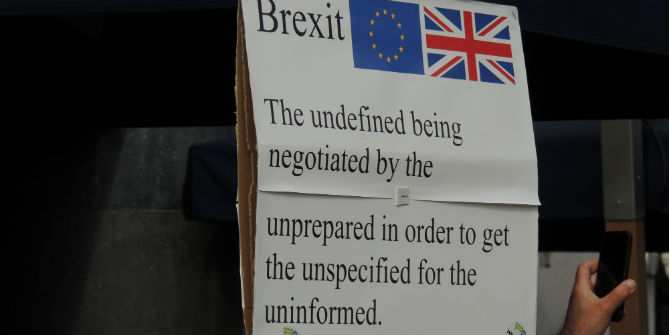 How do liberal Remainers negotiate their dismay and shock at the Leave vote? Daphne Fietz (LSE) talked to nine people who voted Remain and analysed the comment section of the Guardian. She discusses how they deployed different liberal values in an effort to either distance themselves from the ‘irrationality’ of Leavers, or seek compromise.
How do liberal Remainers negotiate their dismay and shock at the Leave vote? Daphne Fietz (LSE) talked to nine people who voted Remain and analysed the comment section of the Guardian. She discusses how they deployed different liberal values in an effort to either distance themselves from the ‘irrationality’ of Leavers, or seek compromise.
While Brexit may be imminent, no one could argue that the form it takes will reflect a consensus. Opinion stability and lasting polarisation have been detected on both the Remain and Leave side – yet we still lack a in-depth understanding of how these dynamics translate to the way ordinary UK citizens create political meaning.
As part of my master’s dissertation, I studied how ordinary liberals make sense of Brexit in early 2019. Based on nine in-depth interviews with professionals aged between 25 and 45 who voted Remain and currently lived in London, and the analysis of comment sections of 21 Brexit-related online articles in the Guardian, I found that both the emotional turmoil triggered by the referendum as well as ensuing modes of stabilisation – the re-creations of order and meaning – were largely mediated by liberal principles. However, because respondents found different ways to assert liberal principles, liberal culture became a vehicle to enable dialogue with Leave supporters, but also to disregard and devalue them.

Before I briefly sketch these ways of liberal meaning-making, let me discuss the context in which they emerged. Much literature on both the causes of Brexit and the referendum’s aftermath has focused on a value divide between conservative/traditionalist/right-wing Leave supporters, and cosmopolitan/global Remain voters. However, in my interviews – which were based on broad, open-ended questions pertaining to changes in social and political attitudes and emotions triggered by Brexit – statements pertaining to conservative or right-wing forces emerged only marginally. Instead, the narratives depicted a more fundamental crisis of trust in a liberal order in which participants were affectively invested. Brexit was not so much narrated as a clash of values, but, to use Anthony Giddens’ terminology, as a ontological destabilisation – that is, a crisis of those principles that have underlain previous predictability in the political arena. Therefore, talking about old and new certainties or dynamics of polarisation, I suggest that to focus on a cultural divide alone does not suffice. Rather, within Brexit, basic liberal principles of what is right and wrong were concomitantly contested, which has considerable relevance to the political actions and attitudes of Remain voters.
Stabilising the liberal order
As the predominant way to reaffirm liberalism’s authority – and thereby to regain their own ontological security as well as status and self-worth – participants and commentators alike turned to demarcation of the Other. Liberal concepts such as autonomy, truth and rationality were used to distinguish the in-group from irrational, stupid, tribal and deluded Leave supporters. Take, for example, one participants’ portrayal of Leave supporters: “They read a paper and it’s the gospel. They don’t question it, whereas if it’s you or me, we have so many assets of information we can make our own decision.”
Here, the charge is that people failed to take on the responsibility of making autonomous rational decisions. Leavers’ failure to pursue ‘rational’ decision-making was also condemned by another participant, who held that they are “like, oh I don’t care. And I think I knew that anyway about people. I know that people are idiots or that people are stupid”, which made him feel “removed from that”. We see similar dynamics depicted by sociologist Jeffrey Alexander in The Civil Sphere: respondents employed binary codes, e.g. reason/emotion, autonomy/dependence, objectivity/subjectivity binaries, to ‘purify’ their own position and to ‘pollute’ Leave.
It is important to point out that by appealing to exogenous standards of rightness, such as autonomy or calculative reason, these moves effectively reduced the space for democratic engagement. The result was a depoliticisation of Leave. Because Leave’s arguments ostensibly fall into the realm of passions, they are incongruent with the liberal standards of the political and therefore banned from deliberative discourse. Likewise, participants and commentators equated truth – (economic) facts – with the best interest of the country. Qualifying public interest in terms of economic calculations, which were posited as a value-free and objective and thus exogenous to politics, likewise excluded other values, interests and worries from the political space.
Moreover, Leave voters were posited as principally incapable of rational discussion; as a respondent told me: “You’re not going to persuade someone otherwise. Even with carefully considered intelligent discussion.” While elsewhere during the interviews the participants affirmed the virtue of rational consensus building, in the face of ‘rationality’s’ perceived or real political and societal defeat, they became distraught, polarised and in the process partly radicalised: “I don’t take anybody’s crap anymore”, “there is no solidarity”, “it’s very much feeling part of one side in a war”. It is important to note that in my data this polarising dynamic was engendered by an Enlightenment conception of liberalism, which posits reason as universal and autonomy as a positive liberty. With these Enlightenment views, repondents experienced a dissonance between the reality of Brexit Britain and how it ought to be. This dissonance had strong affective effects, yielding a breakdown of the possibility of dialogue. In this regard, my study confirms the exclusionary and antagonistic tendencies of an Enlightenment configuration of liberal concepts, which have been conceptually diagnosed as well as empirically observed within the purview of multiculturalism.
While some of the interviewees who reaffirmed liberal principles directed their criticisms at the Other, others turned to the self as a way of overcoming the emotional turmoil instigated by Brexit. A central leitmotif was that participants emotionally recomposed after Brexit. Participants mentioned that they “unworked those very strong emotions [antipathy]” which they connected to thinking “properly” and becoming accommodating to difference. In this, we can see a self-directed alignment with liberal concepts such as rationality, autonomy and open-mindedness, which is vividly articulated in the following statement:
I think I definitely have a better appreciation that not everybody thinks anywhere near the same way that I do (…) and that’s taken some time to get used to and some time to get okay with. I think I’ve been positively impacted by [the EU], but I can appreciate now how other people aren’t as positively impacted, whereas maybe previously I would have treated that as a given, previously. And so, trying to be more open, understanding to different perspectives is something I’ve tried to do.
This respondent not only acknowledged the difference between himself and others, but inferred that other perspectives might be equally valid. Through self-reflective practices and emotional regulation, he regained affective closure and created a political space of discussion and debate. Now, despite having a preference to remain in the EU, respondents supported a ‘pragmatic compromise’, i.e. a soft, regulated Brexit. Here, the authority of liberal principles is confined to the procedural – that is, the recognition of differing views, rather than the substantive outcome of politics; as one respondent told me, politics should “try to come to some centre-ground of understanding and try to honestly work out what the British people want”. Favouring a pragmatic compromise between groups with mutually contingent orientations, these participants found a way to recreate liberal certainties by delimiting their scope; instead of having universal significance, liberal concepts’ potency was confined to the self and to democratic procedures.
Liberal cultures in the referendum’s aftermath
What this study ultimately highlights is the need to consider everyday interactions outside of Westminster and beyond media discourse in order to understand lasting polarisation in general, and the present reconfigurations of liberal culture in particular. Far from simply being a supportive background culture of democracy, liberal culture’s effects are by no means uniform; it is present in disparate dynamics, as an enabler of civic solidarity and democratic dialogue, but also obstructs urgently-needed debate and discussion. For me, the most topical question arising from this study is the significance of the divergence between a rather antagonistic mode of stabilisation engaging in an exclusionary identity project, and the ethical mode, which enables openness and dialogue. Because liberalism reinvents itself constantly, but also because ontological crises facilitate alterations in identity narratives, this raises the question of whether these dynamics point to momentary and subjective reconfigurations – or to broader developments in the cultural structure of liberalism itself, possibly in response to Brexit. Liberalism is experiencing a fragile moment and we need in-depth perspectives in order to understand how liberalism continues to operate in the civil sphere, and the democratic potentials and predicaments these operations engender.
This post represents the views of the author and not those of the Brexit blog, nor LSE.
Daphne Fietz has a background in multimedia arts. She has completed her MSc in Culture and Society from LSE and is a fellow of Cusanuswerk, Germany.







‘Take, for example, one participants’ portrayal of Leave supporters: “They read a paper and it’s the gospel. They don’t question it, whereas if it’s you or me, we have so many assets of information we can make our own decision.”’
In my experience the reporting on this in the media is very one-sided. I have a neighbour who supports remain. His reasoning is that if the Tories are in favour of it then it must be wrong. Leave voters may or may not have sound reasoning for their beliefs but we have to also ask about remain voters.
…”whereas if it’s you or me, we have so many assets of information we can make our own decision.”’
I decided that the Treasury short term predictions for employment were rubbish. I used my own judgement (particularly what happened in the aftermath of our exit from the ERM). How many remain voters believed the Treasury employment forecasts? All of them I guess. Some of them believe that the forecasts were correct even now that the contrary evidence is irrefutable. Personally, I judge whatever actions the Government or the Bank of England had or had not taken after the Referendum, we would never have seen the predicted rise in unemployment. As it is we have record employment.